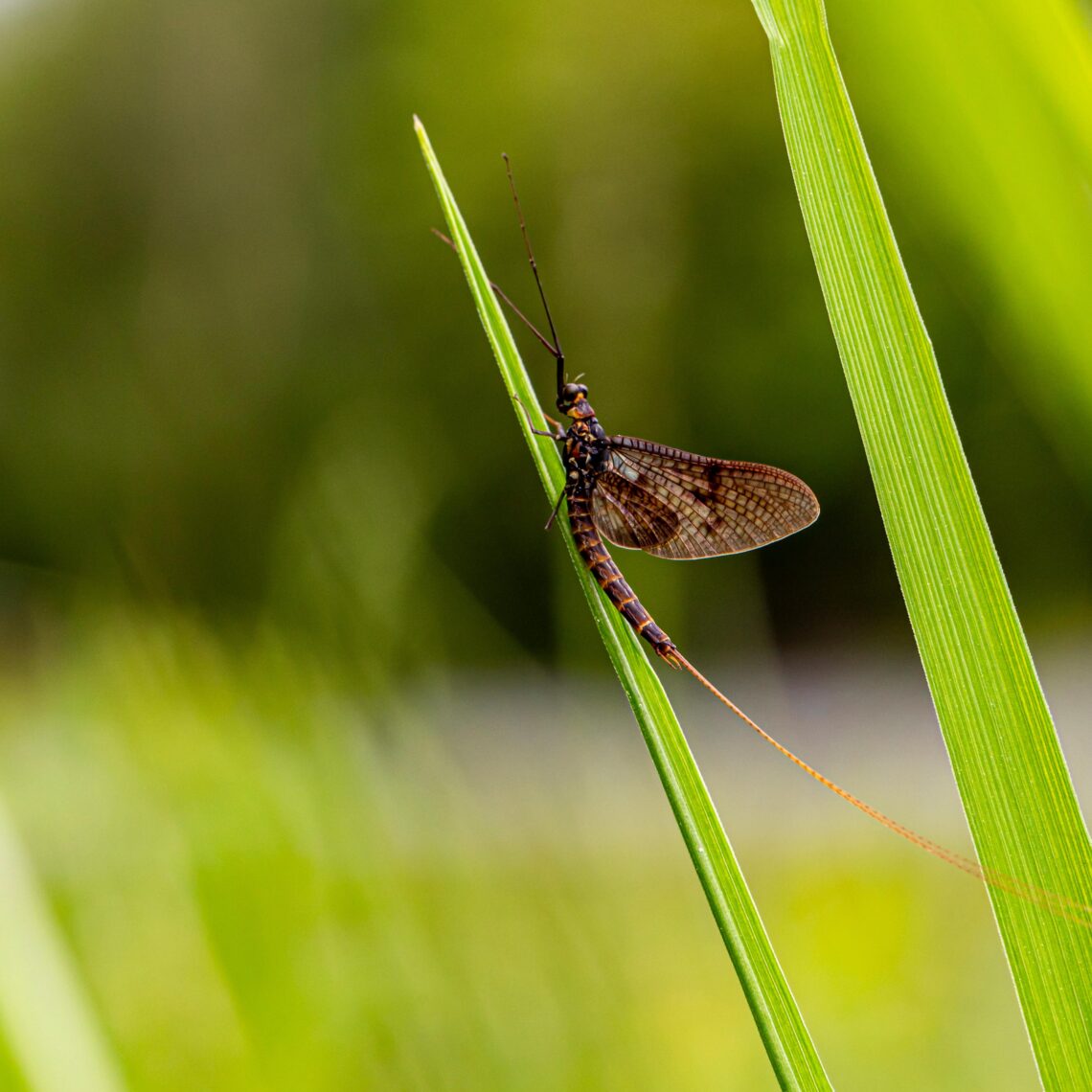Michael Smith
It is a warm day in late May. I have spent the morning cycling through the idyllic rural landscape of southern England, all hedgerows, quaint village churches, and winding lanes dappled with bright, early summer light. The sun has now reached its zenith, and I stop on the grassy bank of a clear brook to enjoy my packed lunch. Life is good.
Later, replete from a delicious selection of delicate sandwiches and real lemonade, I lie down beneath a drooping willow tree, and observe the local wildlife. My presence instills caution in the land-bound creatures, but the water is teeming, and a mayfly hovers above the river’s silvery surface, before dancing in the sun’s spotlight.
As I lie back on the soft grass to search for sleep, or at least a satisfying snooze, my mind wanders lazily to the contents of an old science book, wherein I learned of the unique lifecycle of the mayfly. As a schoolboy I was shocked, outraged even, that a creature could have its entire existence limited to just one day. It seemed so unfair. Now, as a young adult, gradually learning that life can indeed be unfair, I use this moment of uninterrupted bliss to consider a more philosophical angle to the mayfly’s transient existence. To be precise, how would we humans cope if our entire ‘three score years and ten’ were to be compacted into just twenty-four hours? My mind drifts…
***
Suppose we begin our flight of fancy at midnight. In our first hour we would learn to eat, drink, walk, and talk. By 1 am we would already be half our adult size and, of course, house trained. Around 2 a.m. we would start attending school, learning to read, write and calculate.
Some say night is darkest just before the dawn, and such an appropriate hour is when adolescence would kick in. For a whole hour we would be unbearable. The next hour is consumed with examinations, designed to measure the quantity, rather than quality, of the so-called knowledge that has been crammed into us. The results are unimportant in themselves, being more a measure of our potential to have further ‘knowledge’ forced upon us with the aim of becoming useful members of society. But no one ever asks ‘useful to whom?’
Around 6 a.m. things start to become interesting as we ‘spread our wings’ and test our independence. We learn to drive. Some may attend university, while some may start employment; both appearing to involve consuming alcohol, even at this early hour.
Just after breakfast time, all formal education has been completed (and some might add that real education begins). At this point we have reached our full adult size.
8 a.m. will prove to be a popular time to find a mate, and then purchase that first rung on the rickety property ladder. Life is good at this point in our one and only day. But this does not last, and by mid-morning we will be questioning where our life is going. We will be pondering the meaning of life.
These deliberations will be interrupted by an offer of promotion at work, and suddenly all deep, philosophical postulations will be banished by the need to pay the mortgage.
Lunch will be a time to consider, and face, the unpleasant prospect of middle age that now looms large.
Following lunch is that long, almost interminable, period of work, work, work. By afternoon coffee break, we will realize we’re too old for any further promotions; that’s it mate — that’s your lot!
Around teatime we reach our fifties. It has been said that this is when the broad mind and narrow waist of youth suddenly change place. It is a time when we slow down yet, paradoxically, life seems to speed up, and the years fly past with accelerating repetition. This is when we look back on all that we have achieved, frequently with disappointment.
As the sun touches the horizon for our one and only sunset, fellow mayflies may begin to die, their already short existence cut even shorter. The light in the sky and the spark of life in our souls will both dim as we approach the end.
At 10 p.m. we retire, leaving a meagre two hours to enjoy a life without work. The pace slackens further as joints stiffen and memories fade.
By midnight our only task is to make way for the next generation starting their own brief journeys.
***
…my reverie is broken as a large freshwater fish leaps from beneath the river’s surface and catches the mayfly in its gaping mouth. It all seems so unfair, that poor mayfly had the briefest of lives cut even shorter by the greed of a fat fish.
I rise from the grass, extend my arms in a most satisfactory stretch, and remount my bicycle. As I leave this tranquil spot, I realize my contemplation of the mayfly’s brief life may have a wider, cosmic significance. Is this how our seventy years of living might be viewed by some eternal deity? Just an insignificant passing of the briefest of times, a mere twinkling of the eye. Yet, it means everything to us.

Michael Smith’s short stories have been accepted for online publication by Freedom Fiction Journal, Heimat Review, Impspired, Witcraft, Winamop, Fevers of the Mind, The Writers’ Journal and The Hooghly Review. To date, he has self-published Gruseltal, a humorous novel, and two collections of short stories, Fonts, then Songs, all available from the usual online bookstores.
Author website: https://frucht-schleifen.weebly.com/
Featured photo by Erik Karits (Pexels)





